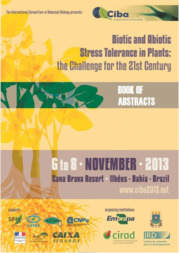Stress tolerance in peanuts: a genomic approach using wild Arachis.
Stress tolerance in peanuts: a genomic approach using wild Arachis.
Autoria: BRASILEIRO, A. C. M.; MORGANTE, C. V.; ARAUJO, A. C. G. de; GUIMARÃES, L. A.; BERTIOLI, S. C. de M. L.; BERTIOLI, D.; FONSECA, L. N.; SARAIVA, M. A. de P.; MARTINS, A. C. A; GUIMARAES, P. M.
Resumo: Cultivated peanut (Arachis hypogaea) has a high morphological but narrow genetic diversity, and understanding the genetic processes of this plant is hindered by the fact that the peanut genome has not yet been sequenced and its genomic resources are still limited. Due to its high genetic diversity and adaptation to a range of environments throughout the evolution course, wild relatives of peanut (Arachis spp.) constitute a rich source of allele diversity for resistance to abiotic and biotic stresses. In particular, A. duranensis and A. stenosperma harbor high adaptability to water stress conditions and root-knot nematode resistance, respectively. In order to identify genes in those wild species that are differentially expressed in response to drought stress and to nematode (Meloidogyne arenaria) challenge we conducted comprehensive transcriptome analyses using sequencing data from Sanger, 454 and Illumina HI-SEQ technologies. In silico analysis revealed that several genes were significantly up- or down-regulated in the stressed or control conditions. Differentially expressed candidate genes related to abiotic and biotic stresses were further selected for validation through RT-qPCR. Among these, expansin, aquaporin, dehydrin, chaperone, nitrilase, transcription factors, resistance protein MG13, resveratrol synthase genes revealed high levels of differential expression in stressed plants. This data confirms the relationship of these genes with drought stress response or root-knot nematode infection in wild Arachis species. The identification of candidate genes for resistance to abiotic and biotic stresses can provide additional resources for peanut breeding and transgenic approaches.
Ano de publicação: 2013
Tipo de publicação: Anais e Proceedings de eventos (considerados no todo)
Palavras-chave: Amendoim, Arachis Hypogaea, Cultivo, Diversidade genética
Observações
1 - Por padrão são exibidas publicações dos últimos 20 anos. Para encontrar publicações mais antigas, configure o filtro ano de publicação, colocando o ano a partir do qual você deseja encontrar publicações. O filtro está na coluna da esquerda na busca acima.
2 - Para ler algumas publicações da Embrapa (apenas as que estão em formato ePub), é necessário ter, no celular ou computador, um desses softwares gratuitos. Sistemas Android: Google Play Livros; IOS: iBooks; Windows e Linux: software Calibre.
Acesse outras publicações
Acesse a Base de Dados da Pesquisa Agropecuária (BDPA) para consultar o acervo completo das bibliotecas da Embrapa.

